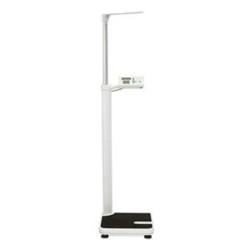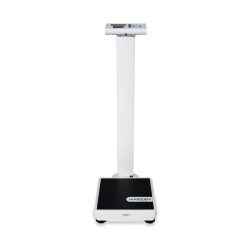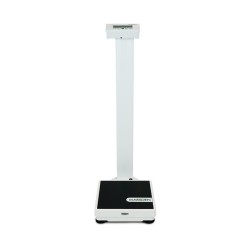Medical Column Scales
There are 3 products.
Active filters
About Medical Column Scales
Professional Standing Scales for Accurate Clinical Weighing
Medical column scales provide professional-grade patient weighing solutions combining accurate weight measurement with height measurement capabilities, serving hospitals, clinics, GP surgeries, and healthcare facilities throughout England, Scotland, Wales, and Northern Ireland. These sophisticated weighing devices feature stable platform bases supporting safe patient standing, precision weighing mechanisms meeting medical standards, integrated height measurement stadiometers enabling body mass index calculation, and prominent vertical column displays facilitating professional appearance and easy reading. Healthcare environments rely on medical column scales for applications including routine patient weight monitoring tracking changes over time, medication dosing calculations requiring accurate weight data, body mass index assessment screening for weight-related health risks, pre-operative assessment gathering baseline measurements, and clinical trials requiring precise weight and height data. Modern medical column scales incorporate features including touchless operation reducing cross-contamination risks, automatic body mass index calculation eliminating manual computation, data connectivity transferring measurements to electronic health records, and robust construction withstanding intensive clinical use. The provision of medical column scales demonstrates professional clinical standards through appropriate equipment investment, supports comprehensive patient assessment through combined weight and height measurement, and enables efficient clinical workflow through integrated measurement capabilities across professional healthcare environments.
The implementation of medical column scales directly supports CQC compliance through accurate clinical measurement, comprehensive patient assessment, and demonstration of appropriate equipment provision meeting professional healthcare standards. Traditional separate weighing and height measurement approaches require multiple steps, increasing time requirements and introducing potential errors through equipment variation or measurement technique differences. Medical column scales address these challenges by integrating weight and height measurement in single equipment, enabling simultaneous data capture eliminating transcription errors, providing automatic BMI calculation supporting clinical interpretation, and delivering professional patient experience through quality equipment. Clinical benefits include comprehensive anthropometric assessment informing clinical decisions, efficient workflow supporting busy clinical environments, and reliable data supporting population health monitoring and clinical audit. Healthcare organisations benefit from integrated measurement approaches through time savings enabling more patients to be assessed, reduced errors from automated calculations, and enhanced data quality supporting clinical governance. Modern medical column scales incorporate advanced features including voice guidance supporting consistent measurement technique, wireless data transmission eliminating manual recording, and various measurement units accommodating different clinical preferences throughout England, Scotland, Wales, and Northern Ireland.
Selecting and implementing medical column scales requires assessment of clinical requirements, appropriate equipment specification, and establishment of quality protocols across healthcare facilities throughout the UK. Organisations should evaluate patient throughput determining whether premium column scales justify investment versus basic floor scales, assess clinical requirements identifying needs for height measurement and BMI calculation, and consider practical factors including available space, electrical supply, and aesthetic preferences. Equipment selection should prioritise medical device certified scales meeting accuracy standards for both weight and height, appropriate capacity typically 250-300kg for general populations, clear displays readable from varied positions, and stable construction ensuring patient safety during measurement. Implementation protocols must encompass staff training on correct scale operation including proper patient positioning for height measurement, equipment calibration verification, and data recording procedures. Quality assurance measures should include regular calibration schedules maintaining accuracy for both weight and height mechanisms, documented maintenance records demonstrating compliance, cleaning protocols preventing cross-contamination, and monitoring of measurement-related incidents. Modern medical column scales incorporate features such as large colour displays improving readability, multiple user profiles enabling personalised settings, and antimicrobial coatings supporting infection prevention. Organisations should establish measurement protocols standardising techniques across staff, determine appropriate measurement frequencies for different patient groups, and integrate anthropometric data into clinical decision-making processes. Clinical teams should consider patients with specific needs including bariatric patients potentially requiring specialist high-capacity equipment, very tall patients needing extended height measurement range, and patients with mobility issues requiring scales with handrails. Documentation systems should record calibration, staff training, and clinical use demonstrating quality assurance. By maintaining calibrated medical column scales and implementing professional measurement protocols, healthcare organisations throughout England, Scotland, Wales, and Northern Ireland demonstrate their commitment to CQC standards, accurate clinical assessment, comprehensive patient monitoring, and the provision of professional equipment that supports efficient, reliable anthropometric measurement enabling evidence-based clinical decisions and population health monitoring across all care settings.



